9+ SAMPLE Option to Purchase Agreement
-
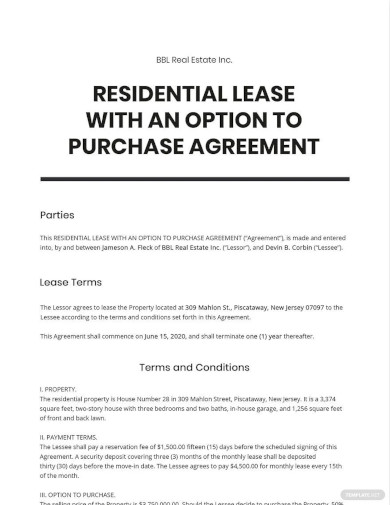
Residential Lease with an Option to Purchase Agreement Template
download now -
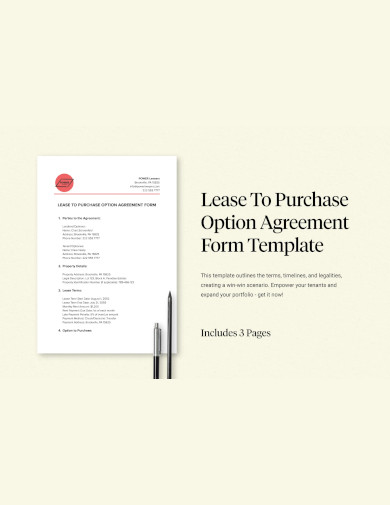
Lease To Purchase Option Agreement Form Template
download now -
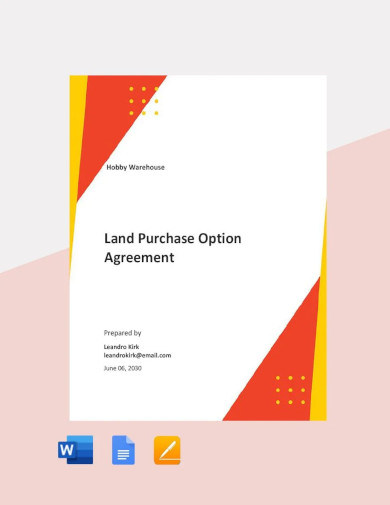
Land Purchase Option Agreement Template
download now -
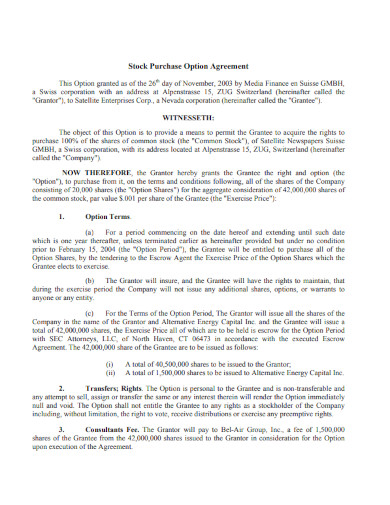
Stock Purchase Option Agreement Template
download now -
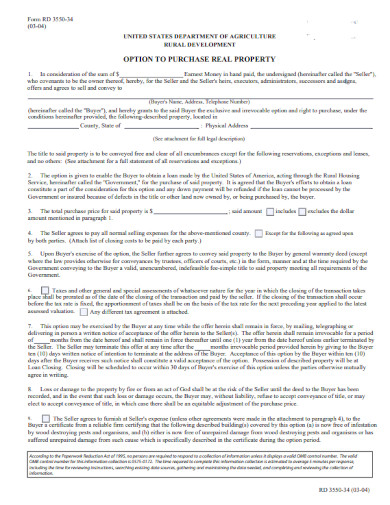
Option to Purchase Real Property Agreement
download now -
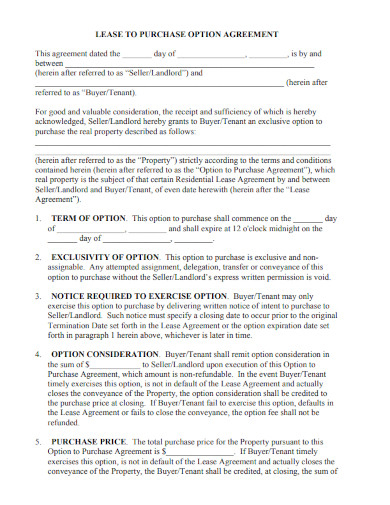
Lease to Purchase Option Agreement
download now -
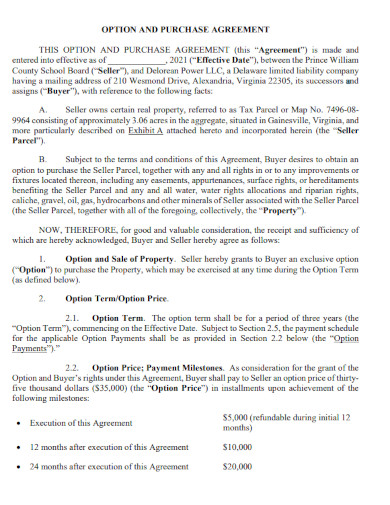
Sample Option and Purchase agreement
download now -
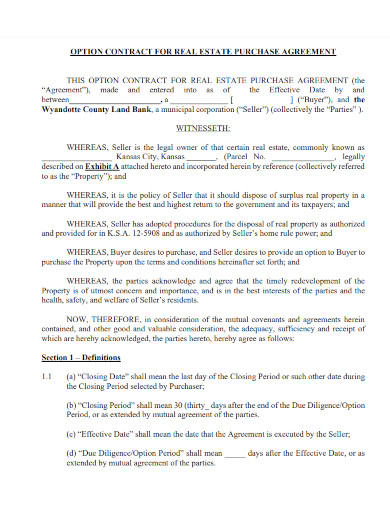
Option Contract for Real Estate Purchase Agreement
download now -
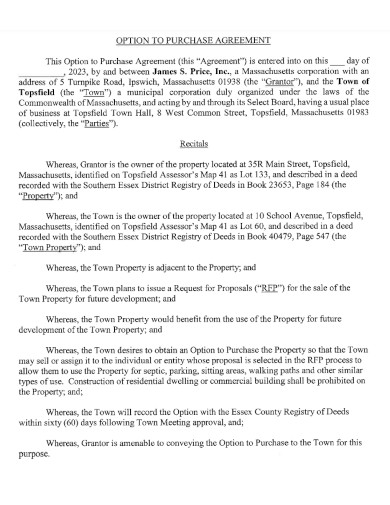
Printable Option to Purchase Agreement
download now -
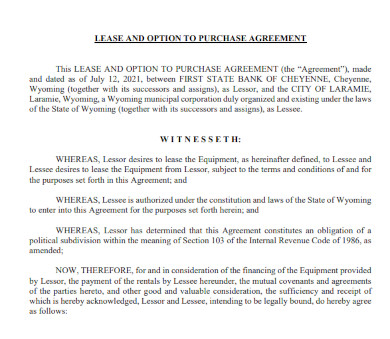
Sample Lease and Option to Purchase Agreement
download now
FREE Option to Purchase Agreement s to Download
9+ SAMPLE Option to Purchase Agreement
What is an Option to Purchase Agreement?
Benefits of an Option to Purchase Agreement for Buyers and Sellers
How Does an Option to Purchase Agreement Work?
How Binding is the Option to Purchase Agreement?
Can the Option to Purchase Agreement Be Extended?
An Option to Purchase Agreement presents a unique agreement of framework in real estate transactions, offering distinctive advantages to both buyers and sellers. This strategic contract introduces a dynamic pause in the buying process, fostering an environment of transparency, flexibility, and informed decision-making. Here are the key benefits for both parties:
Benefits for Buyers:
Time and Flexibility: The option period grants buyers exclusive rights to the property, providing valuable time for thorough due diligence, inspections, and assessments. This temporal exclusivity minimizes rushed decisions, allowing buyers to make informed choices.
Risk Mitigation: Buyers are protected from potential market fluctuations during the option period. They have the flexibility to back out of the agreement without significant financial loss if they choose not to exercise the option.
Strategic Planning: The agreement enables buyers to strategically plan their finance agreement and logistics, ensuring a smoother transition from decision-making to the actual purchase. This planning contributes to a more organized and confident buying process.
Locking in Purchase Price: Buyers can lock in a predetermined purchase price during the option period, safeguarding them from potential price increases in a dynamic real estate market.
Benefits for Sellers:
Guaranteed Option Fee: Sellers receive an upfront option fee from the buyer, regardless of whether the option is exercised. This fee compensates the seller for temporarily taking the property off the market.
Market Exploration: While the property is under an option, sellers have the opportunity to gauge market interest agreement. If a more attractive offer comes along, the seller may negotiate with the current option holder or let the option expire to pursue other opportunities.
Reduced Holding Costs: During the option period, the property is effectively reserved for the potential buyer. This reduces the holding costs for the seller as they continue to market the property without the full commitment of a sale until the option is exercised.
Enhanced Negotiation Position: Sellers retain a degree of negotiation power during the option period. If the buyer is serious about exercising the option, the seller may negotiate favorable terms for the final sale.
How Does an Option to Purchase Agreement Work?
An Option to Purchase Agreement operates as a strategic and flexible tool in real estate transactions, providing a structured process for potential buyers and sellers. Here’s a step-by-step breakdown of how it typically works:
1. Agreement Initiation:
The process begins with the interested buyer and seller entering into an Option to Purchase Agreement. This agreement outlines the terms and conditions under which the buyer has the exclusive right to proposal of purchase the property within a specified timeframe.
2. Exclusive Rights Granted:
Once the agreement is in place, the buyer, known as the option holder, gains exclusive rights to the property during the option period. This period is agreed upon by both parties and can vary but is commonly 30 to 90 days.
3. Option Fee Payment:
To secure these exclusive rights, the option holder typically pays an option fee to the seller. This fee is usually non-refundable and compensates the seller for taking the property off the market and granting exclusivity to the buyer.
4. Due Diligence:
During the option period, the buyer conducts due diligence on the property. This may involve inspections, appraisals, and assessments to ensure the property meets their expectations and requirements.
5. Decision to Exercise the Option:
At the end of the option period, the buyer has the choice to either exercise the option and proceed with the purchase or allow the option to expire. If the buyer chooses not to exercise the option, the seller is free to entertain offers from other potential buyers.
6. Purchase Process Initiation:
If the buyer decides to proceed, the standard processes for the property transfer are initiated. This includes finalizing the purchase price, securing financing, and completing any additional necessary steps to fulfill the conditions outlined in the contract and agreement.
7. Closing the Transaction:
The final step involves closing the real estate transaction. The buyer completes the purchase, and ownership agreement of the property is transferred from the seller to the buyer according to the terms specified in the Option to Purchase Agreement.
Important Considerations:
Exclusivity Clause: The seller is typically bound by an exclusivity clause during the option period, preventing them from entertaining offers from other potential buyers.
Fixed Purchase Price: The purchase price is often predetermined and fixed in the agreement, providing certainty for both parties.
Option Fee: The option fee is a key component, compensating the seller for granting exclusivity to the buyer. It is separate from the purchase price and is usually non-refundable.
Due Diligence: The option period allows the buyer to thoroughly assess the property, mitigating risks associated with unforeseen issues.
How Binding is the Option to Purchase Agreement?
The agreement is legally binding once both parties agree to its terms and sign. It outlines the rights and obligations of both the buyer and the seller, and breaching the terms can have legal consequences.
Can the Option to Purchase Agreement Be Extended?
The extension of the option period is subject to mutual agreement between the buyer and the seller. Both parties must agree to any modifications or extensions of the original blank agreement.
In conclusion, this guide on Option To Purchase Agreement provides essential insights and practical tips for drafting effective agreements. The examples offered illustrate diverse scenarios, aiding readers in customizing agreements to meet specific needs. Emphasize the significance of clarity and detail in such agreements, ensuring a smooth real estate transaction. Encourage readers to utilize the provided guide for comprehensive and legally sound Option To Purchase Agreements.
